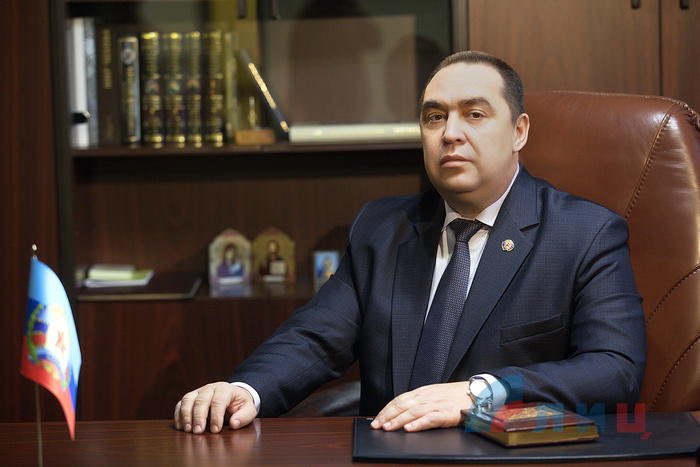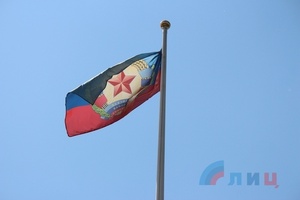
Plotnitskiy: LPR primaries show Republic is ready to hold elections
LPR Head Igor Plotnitskiy said today that the primaries were transparent, fair and showed that the Republic is ready to hold local elections.
"Preliminary public vote is an accomplished fact, we have made another step on the way of building up national institutions," Plotnitskiy stated.
The vote count is ongoing, he said, but taking into account the patriotism of all candidates, "it will be a common victory whoever wins."
"We are ready to hold elections on our own. We pass the ball to Kiev. It is time for Poroshenko to realize that protracting fulfillment of Minsk agreements is a crime against the people who fought for their freedom and independence," Plotnitskiy added.
"One of our major tasks was to organize transparent voting with only self-nomination available. The sole condition candidates had to meet was residents' support," he explained.
"International observers along with LPR people could make sure all procedures were as open and transparent as possible. In four months over 30 international observers visited LPR. I want to thank them for the work they've done," LPR Head said.
Plotnitskiy also expressed gratitude to Lugansk, Russian and foreign journalists for an extensive and detailed coverage of the primaries.
According to LPR Head, People's Militia that was responsible for security during the primaries, has met highest expectations, having averted provocations that could have marred the vote.
The preliminary public voting was held in LPR on October, 2nd. The turnout in the first LPR primaries was more than 61 thousand voters who cast their ballots for 234 candidates at a total of 80 polling stations in 54 wards in Lugansk, Aleksandrovsk and Yubileiniy. The residents were choosing candidates to local authorities positions, with 720 volunteers facilitating the work of polling stations commissions.
No violations or incidents concerning voting procedures or public order were reported.
LPR Head Igor Plotnitskiy on the voting day urged people to actively participate in the primaries to determine opinion leaders. He cast his vote, saying he was choosing peace and future.
Plotnitskiy announced on July, 4th, the preliminary public voting (primaries) for the candidates to local authorities positions. Earlier he declared that the Republic would hold local elections if Kiev, even pressured by the West, refused to fulfill the political part of the Minsk agreements, which stipulates local elections in Donbass.
"Today our society shows an explicit intention to hold local elections. We can not wait forever for Kiev to hear the demands of our people. I have decided to support this initiative that will give us an opportunity to test candidates and see the public opinion," Plotnitskiy then said.
He guaranteed transparent and fair procedures fully compliant with democratic, moral principles and OSCE standards to all the participants.
"Ukraine election law does not permit self-nomination for party members, while in the Republic it is possible to nominate oneself, it is not prohibited. Time will show whom our people choose. But we shall never welcome those political forces that supported "anti-terrorst operation" (ATO) directly or indirectly, or by omission or powerlessness," LPR head stated.
The representatives of LPR major civil movements, Mir Luganshchine (Peace to Lugansk) and Lugansk Economic Union, declared full support to the voting.
The public assemblies were held in 14 LPR towns, each to elect 7 delegates to the General meeting. The General meeting on July, 24th appointed 15 members to the Interim Vote Commission (IVC) that defines voting districts, members of local territorial and district commissions, work out candidate nomination procedure, etc. LPR's justice minister Sergey Kozjakov was elected to head the IVC. The vote steering committee on July, 26th decided to hold the primaries in Lugansk, town of Aleksandrovsk and Yubileyniy settlement on October, 2nd.
IVC registered 234 candidates for the primaries, the campaigning finished on 30 September. All candidates were guaranteed free access to mass media. Some entities and persons, for instance public authorities, military units, charities, foreigners and foreign legal entities were not allowed to campaign. The Commission imposed some limitations as well: Nazi symbols, race discrimination, inciting violence, etc. were banned.



